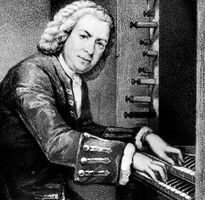
Entertainment – We live in an age of passiveness. We love to be entertained! While there is nothing wrong with that per se, demanding a steady diet of “just being entertained” can rob us of so much. Entertainment requires very little of the observer. All the observer has to do is be present. Nothing is demanded really. It requires no thought, no planning, no energy, and no response other than occasional adulation or applause.
Art – On the other hand, Art requires thought, planning, energy, and response, but mostly inspiration.
Consider Bach’s genius. For years he composed new music for Church services every week. Monday mornings he spent in his own musical thoughts, thinking and developing ideas and searching for inspiration. As the week progressed, the score progressed for the new cantata or chorale. He employed his children as sort of an assembly line to copy off the parts for the orchestra and singers. (This was a way before Xerox or computers!) By Thursday rehearsals the musicians began to work on their parts. By Sunday, the bugs were worked out and the new piece was premiered. Then, the next day, Monday, the whole process began all over again. Bach’s music is amazing, as timeless and contemporary now as it ever was! If you ever want to spend time expanding your brainpower, try playing or singing Bach.
That is ART – in full capital letters, boldfaced and underlined for a reason! Bach’s music required thought and planning and energy and inspiration in its conception and in its performance, but we as observers have to use quite a bit of thought (mental exercise), and planning (you might say research), and energy (practice) and inspiration (spiritual enlightenment) to understand it, too. And once we understand it, we can enjoy it and have an intellectual, emotional, and/or spiritual response to it.
Some say this is too difficult. Understanding Bach is too hard. “I’ll never understand it. Just sounds like a lot of noise to me.” Not all of Bach’s music is contrapuntal and intellectual. Some of the little gems he wrote for his wife and children are the most recognizable and enjoyed melodies of all time. There is probably not a person alive today who would not recognize Bach’s “Jesu, Joy of Man’s Desiring.” This beautiful piece has melodies and countermelodies going on all at the same time, but it definitely does not sound like a lot of noise. From a completely mathematical perspective, the piece is awesome, but the spirit conveyed is much more so. Bach himself dedicated all of his music to the glory of God. Most composers have studied Bach. Many have used his music as their model. But he is still in a class by himself. We can thank Bach for many things in music today. He not only wrote beautiful music that is still performed regularly, but he came up with the well-tempered system of tuning which allows our modern instruments to play together and stay in tune in any key.
Using Bach as an influence is not a bad idea. In my very humble way, I have borrowed and developed ideas from the master. The publisher asked for hymn arrangements that followed the template of Bach’s “Jesu, Joy of Man’s Desiring,” and I gave him just that in “Have I Done Any Good?” for SAB chorus and piano. A violin obligato is also included on the web page. My other piece that is unabashedly influenced by Bach is “Come Unto Him.” Two versions are offered on the web site, one for Mixed Chorus and Piano, the other for Wind Quintet and Harp.
Music – Is it Art or Entertainment? The next time a referendum comes up about removing Music from the schools, I hope that you will vote instead to keep it funded – as an academic subject. The ancient Greeks understood how beneficial music was to build character, intellect, and culture. Music has great power for good. That power can also be exploited for bad. Through education, training and practice we can harness the power for good of music in our lives and not be just passive observers.
 RSS Feed
RSS Feed